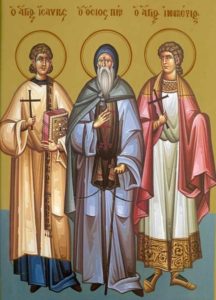Feast Day ~ June 17
 The life of a diplomat is not an easy one and the responsibilities are great. The fate of nations and the lives of many people often depend on the negotiating skills of the diplomat. The give and take, back and forth, demand and compromise in tense political bargaining require patience and the ability to phrase the bargaining points to the advantage of those the diplomat is representing. In 4th century Persia, one family contributed three sons to this profession and the brothers were very good at diplomacy.
The life of a diplomat is not an easy one and the responsibilities are great. The fate of nations and the lives of many people often depend on the negotiating skills of the diplomat. The give and take, back and forth, demand and compromise in tense political bargaining require patience and the ability to phrase the bargaining points to the advantage of those the diplomat is representing. In 4th century Persia, one family contributed three sons to this profession and the brothers were very good at diplomacy.
Manuel, Sabel, and Ishmael had been born into a “mixed” family: their father was a pagan, but their mother was Christian and she had raised her sons in the faith. After military service, they all three were employed as ambassadors by the Persian King, Alamundar, and were sent to negotiate a treaty with the Byzantine Emperor, Julian (known as the “Apostate” for his having abandoned the Christian faith). The two empires had been traditional enemies for centuries, each always waiting for an opportunity to invade the other and increase its territory. But it appeared that each ruler was also anxious to avoid armed conflict, so this diplomatic mission was extremely important.
All went well with the meetings, held in the city of Chalcedon, and a peace treaty was agreed upon and signed. The brothers had completed their task and were ready to attend the customary banquet to celebrate the end of negotiations when they were shocked to discover that the Emperor had planned a ceremony of sacrifice to pagan idols before the banquet and that they were expected to participate. While Christianity was the religion of a very small portion of the Persian population, numerous other religions were practiced and their faith had never been a deterrent to their positions as representatives of the pagan king. As politely as they were able, Manuel, Sabel, and Ishmael declined the banquet invitation and made plans to return home earlier than expected.
But Julian would have none of it. In rage, he nullified the terms of the peace treaty and had the brothers arrested. Perhaps the entire incident had been a “set-up” so that the Emperor could have an excuse to void the peace treaty and he had simply been trying to determine the Persian army’s readiness for conflict, but peace was now thrown aside and war was inevitable.
A mock “debate” was held between Julian and his diplomatic captives. The brothers were unswerving in their love for Christ and his Church and their refusal to bow down before any false gods. The Emperor then ordered that they be tied to trees and tortured by flailing, that they be put to death by the sword and their bodies burned. The brothers prayed throughout their ordeal of torture and received the crown of martyrdom, faithful to the end. A sudden earthquake prevented the soldiers from burning the bodies of the martyrs as ordered and soon, the local Christians were able to retrieve them for proper burial.
When King Alamundar heard of the murder of his envoys by the Emperor and that Byzantine forces were on their way to attack, he immediately readied his army for battle. Julian was confident of victory in this war with Persia, but he was killed in battle, his army was trapped, and his war was lost.
Manuel, Sabel, and Ishmael were martyred in the year 362. Thirty years later, another Emperor – Theodosius – built a church at Constantinople in honor of these holy martyrs who had died at the hands of his predecessor.
We ask for the prayers of the martyrs Manuel, Sabel, and Ishmael that diplomats may be protected in their work, that diplomacy may help nations achieve peace and avoid war, and that we may be faithful in our love for Christ to the ends of our lives.
Resources: Prologue From Ochrid by St. Nikolai (Velimirovic); Orthodox Saints by George Poulos; online articles from Mystagogy Resource Center and ROCOR New York City Deanery; Western Rite Orthodox Martyrology.